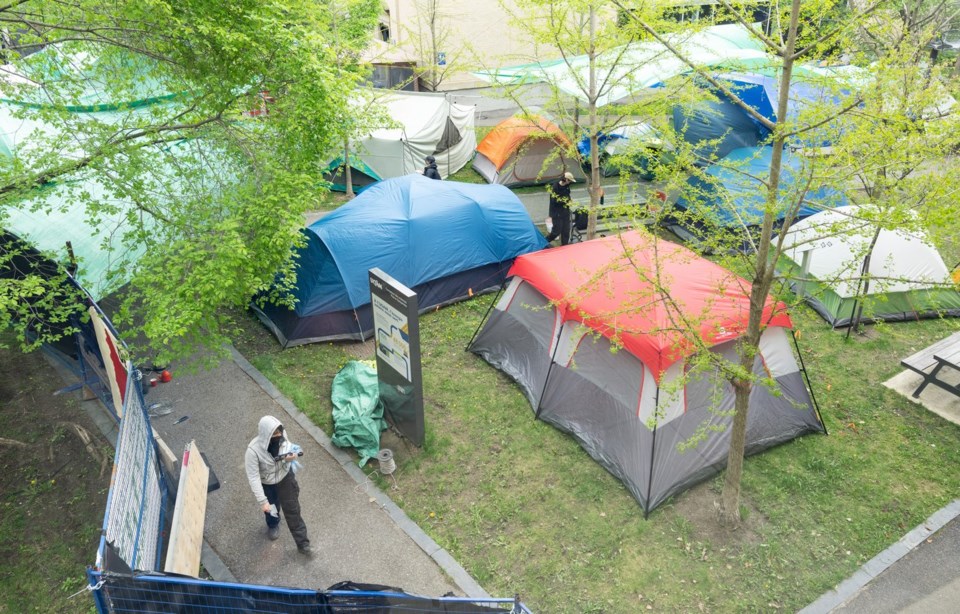MONTREAL — A judge has granted Université du Québec à Montréal a partial injunction against pro-Palestinian protesters who set up an encampment on its downtown campus earlier this month.
Superior Court Justice Louis J. Gouin ruled Monday that safety measures need to be put in place at the encampment, and that doing so won't infringe on the encampment members' right to protest.
"It's essential that appropriate security measures be put in place immediately in order to prevent an unfortunate event from happening and for UQAM to suffer serious or irreparable harm," Gouin wrote.
"In the present circumstances, it is definitely preferable to prevent rather than to heal."
Gouin said he was prohibiting protesters from setting up tents and other material within two metres of campus buildings, instead of the three metres UQAM had requested. The protesters had asked that the distance be set at one metre.
Protesters have also been ordered to ensure doors, windows and walls are clear of obstructions; to remove cardboard blocking security cameras; and to allow representatives from the school and fire department to visit the camp to make sure it's safe.
The measures are in place for the next 10 days.
Protesters had said the security corridor requested by the school would force them to dismantle their camp, an argument that Gouin rejected. He said that while protesters might have to reduce the size of the encampment or rearrange it, the rules he was imposing were in everyone's best interest.
"These security measures won't harm the exercise of the right to freedom of expression, including to protest, of the defendants," he wrote. "In fact, it will help set limits on the demonstration ... for it to take place in complete safety for all parties, subject to their respective rights to be asserted during the subsequent steps in the injunction process."
UQAM had argued that protesters were posing a safety risk by blocking an emergency exit, being in possession of gasoline canisters and iron bars, and potentially "overloading" the university's electrical network with unauthorized extension cords.
On the other side, lawyers for the protesters said the encampment members had already taken steps to clear exits, and that the demonstration was safe and peaceful.
Since the encampment started on May 12, protesters have demanded that the university cut ties with Israeli institutions and disclose its links to Israel, and that the Quebec government cancel plans for a diplomatic office in the country.
The university's court application said the inner courtyard of its science complex is being occupied by about 40 tents.
In a statement on Monday, the school said it was counting on protesters to respect the judge's decision, which it said would ensure safety and free movement on campus.
"Moreover, UQAM will continue the dialogue with students, including those who are in the camp, in connection with their concerns about the situation in Palestine and Israel," rector Stéphane Pallage wrote. "Once security issues have been resolved, the dialogue on the merits of the demands can continue peacefully."
Encampments have been erected in several Canadian cities, following a wave of similar campus protests in the United States linked to the Israel-Hamas war.
UQAM noted that it had not sought an injunction to dismantle the encampment and did not want to stop students from expressing themselves.
Other schools, however, are asking courts to end the weeks-long protests. The University of Toronto said Monday it is taking legal action in an effort to clear an encampment of pro-Palestinian protesters from its downtown campus, after a trespass notice issued Friday failed to convince them to leave.
In Montreal, McGill University is seeking an interlocutory injunction to force protesters to dismantle dozens of tents on its lower field, after failing to convince a judge earlier this month to grant a provisional court order based on urgency. That case is expected to be heard in July.
This report by The Canadian Press was first published May 27, 2024.
— With files from Rianna Lim and Paola Loriggio in Toronto
Morgan Lowrie, The Canadian Press



